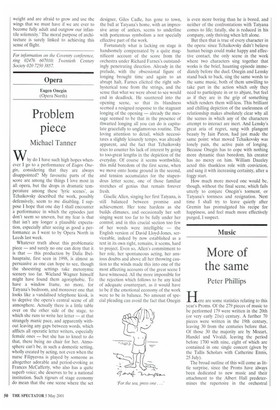Opera
Eugen Onegin (Opera North)
Problem piece
Michael Tanner
Why do I have such high hopes whenever I go to a performance of Eugen Onegin, considering that they are always disappointed? My favourite parts of the score are among the things I love most in all opera, but the drops in dramatic temperature among these 'lyric scenes', as Tchaikovsky described the work, possibly defensively, seem to me disabling. 1 suppose I hope that one day I shall encounter a performance in which the episodes just don't seem so uneven, but my fear is that that isn't any longer a plausible expectation, especially after seeing as good a performance as I went to by Opera North in Leeds last week.
Whatever truth about this problematic piece — and surely no one can deny that it is that — this production by Dalia lbelhauptaite, first seen in 1998, is almost as persuasive as one can hope to see, though the shoestring settings take metonymic scenery too far. Wieland Wagner himself might have found them agoraphobic. To have a window frame, no more, for Tatyana's bedroom, and moreover one that looks like a vandalised telephone kiosk, is to deprive the opera's central scene of all atmosphere. Actually there is a little table over on the other side of the stage, to which she runs to write her letter — at that strangely manic pace, and apparently without leaving any gaps between words, which afflicts all operatic letter writers, especially female ones — but she has to kneel to do that, there being no chair for her. Atmosphere can't be, in such a domestic setting, wholly created by acting, not even when the nurse Filipyevna is played by someone as altogether adorable and period-evoking as Frances McCafferty, who also has a quite superb voice; she deserves to be a national institution. Such rigours of stage economy do mean that the one scene where the set designer, Giles Cadle, has gone to town, the ball at Tatyana's home, with an impressive array of antlers, seems to underline with portentous symbolism a not specially effective part of the work.
Fortunately what is lacking on stage is handsomely compensated by a quite magnificent account of the score from the orchestra under Richard Farnes's outstandingly penetrating direction. Already in the prelude, with the obsessional figure of longing brought time and again to an abrupt halt, Fames elicited the right subhysterical tone from the strings, and the sense that what we were about to see would end in deadlock. He sauntered into the opening scene, so that its blandness seemed a resigned response to the stagnant longing of the opening — already the message seemed to be that in the presence of thwarted longing all you can do is capitulate gracefully to unglamorous routine. The loving attention to detail, which necessitates a slightly leisurely tempo, was already apparent, and the fact that Tchaikovsky tries to counter his lack of interest by going to too-great lengths in the depiction of the everyday. Of course it seems worthwhile, this mild boredom of the first scene, when we move onto home ground in the second, and tension accumulates for the stupendous letter scene, one of those familiar stretches of genius that remain forever fresh.
Giselle Allen, singing her first Tatyana, is still balanced between promise and achievement. Her tone hardens as she builds climaxes, and occasionally her soft singing went too far to be fully under her control; and in this crucial section too few of her words were intelligible — the English version of David Lloyd-Jones, serviceable, indeed by now established as a text in its own right, remains, it seems, hard to project. Even so, Allen's commitment to her role, her spontaneous acting, her anxious doubts and above all her throwing caution to the winds made this into one of the most affecting accounts of the great scene I have witnessed. All the more impossible for the rejection which follows to be any kind of adequate counterpart, as it would have to be if the emotional economy of the work were to be in balance. No amount of special pleading can avoid the fact that Onegin
is even more boring than he is bored, and neither of the confrontations with Tatyana comes to life; fatally, she is reduced in his company, only thriving when left alone.
But then that is true of every character in the opera: since Tchaikovsky didn't believe human beings could make happy and effective contact, the only scene in the work where two characters sing together that works is the brief, haunting episode immediately before the duel. Onegin and Lensky stand back to back, sing the same words to the same music, both of them unwilling to take part in the action which only they need to participate in or to abjure, but feel as if they are in the grip of something which renders them will-less. This brilliant and chilling depiction of the uselessness of relationship makes absolutely clear why all the scenes in which any of the characters attempt to interact are inert. And Lensky's great aria of regret, sung with plangent beauty by lain Paton, had just made the same point: what moved Tchaikovsky was lonely pain, the active pain of longing. Because Onegin has to cope with nothing more dynamic than boredom, his creator has no mercy on him. William Dazeley acted this thankless role with conviction, and sang it with increasing certainty, after a foggy start.
How much more moved one would be, though, without the final scene, which fails utterly to conjure Onegin's torment, or Tatyana's tornness and resignation. Next time I shall try to leave quietly after Gremin has promulgated his recipe for happiness, and feel much more effectively purged, I suspect.










































































 Previous page
Previous page